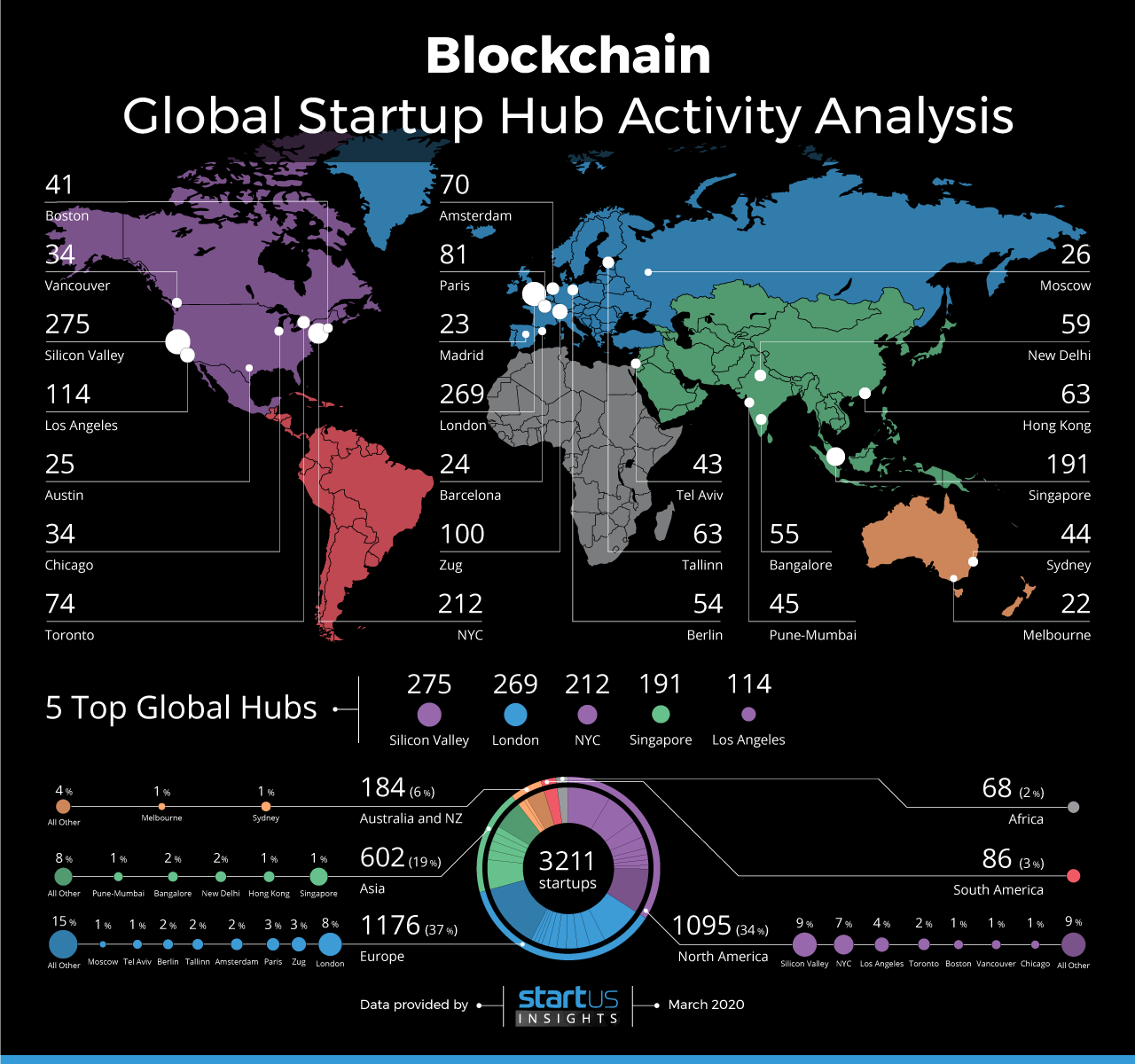Blockchain is a decentralized list of immutable records that uses cryptography to ensure transparency and security during transactions. The underlying distributed ledger technology (DLT) spans a large peer-to-peer (P2P) network and all transactional information is both public and secure. Naturally, the earliest use cases of the technologies were in FinTech. Cryptocurrencies are blockchain-based virtual currencies that aim to revolutionize finance and banking. Since blockchain enables peer-to-peer transaction, it eliminates the transaction costs and needs only infrastructure costs to operate. Particular aspects of blockchain technology, such as immutable record keeping, find applications in other industries such as healthcare and logistics, where the integrity of records is crucial.
The legal and regulatory issues surrounding cryptocurrencies vary considerably across the world. These range from countries being actively encouraging to skeptical to outright hostile towards cryptocurrencies. However, we observe applications of blockchain technologies in use across industries that increase their adoption. Blockchain technology also potentially benefits governments and public agencies by enhancing their transparency and accountability.
Top 5 Global Blockchain Startup Hubs
Using our StartUs Insights Platform, we analyzed the geographic distribution of global activity in the blockchain field. We identified 25 regional hubs* that observe high activity in developing blockchain solutions across industries such as healthcare, manufacturing, and construction, to name a few.
According to our data, Silicon Valley, London, New York City, Singapore, and Los Angeles are home to 1.061 startups* and account for 34% of global startup activity. Let us have a look at some of the blockchain startups from these 5 top hubs.
According to our data, nearly three-fourths of all activity in blockchain occurs in Europe and in North America. Novel use cases for blockchain combined with hubs for innovations in the technology create ideal conditions for blockchain to reinvent finance and disrupt various other industries.
Even though the rest of the world sees comparatively lower activity, Switzerland and Canada are home to a significant number of blockchain solutions. As blockchain introduces decentralization to multiple industries and as more companies adopt it, businesses look to move towards transparency and security for their transactions and documentation.
#1 Silicon Valley | 275 Startups
The large number and variety of startups in Silicon Valley provide opportunities to experiment and easy access to venture capital. This has led to startups combining blockchain with other technologies such as the Internet of Things (IoT) to develop innovative use cases for blockchain technology. These solutions apply to a range of industries, such as smart construction, Industry 4.0, food and pharma packaging, and agriculture.
Silicon Valley-based startup AgroTrak offers an end-to-end intelligent cold chain logistics platform. The solution combines blockchain, long-range (LoRa) IoT, and image recognition to ensure food safety throughout the supply chain. The IoT sensors monitor the cold chain and smart QR codes aggregate data at each step. The startup uses blockchain to guarantee the data integrity of the entire cold chain. This allows them to supply perishables to Asian markets in 36 hours or less.
#2 London | 269 Startups
London has a friendly regulatory environment, simple registration procedures, a strong FinTech industry, and is close to other European markets. These factors contribute to the city’s position as a global hub for blockchain innovations. Top universities in the area are active in the field with centers for cryptocurrency research and alternative finance. In 2018, the UK Government announced a Cryptoassets Taskforce to support the growth of blockchain startups.
MonoChain is a London-based startup that develops blockchain-based solutions for a sustainable and circular economy. The company uses blockchain to connect the primary and secondary sale markets to encourage the reuse of products and lengthen their life. The technology also detects counterfeits and reduces the social and environmental impact of counterfeit goods or their raw materials. The solution applies to brands and retailers looking to build consumer trust by guaranteeing the authenticity and source of their products.
#3 New York City | 212 Startups
New York City is a traditional financial hub, as well as an emerging tech hub. Since much of the earliest blockchain innovations occurred in FinTech, New York benefits from the confluence of finance and tech and has many blockchain startups. To capitalize on its early gains, the city launched the Blockchain Resource Center, a physical hub to connect entrepreneurs and promote awareness of the technology, in 2018.
Hailing from New York, Fluidity is a FinTech startup that offers solutions to bridge the gap between traditional finance and open, decentralized FinTech infrastructure. The startup develops AirSwap, a peer-to-peer trading platform powered by Ethereum, an open-source, blockchain-based distributed solution. A decentralized protocol allows traders to buy or sell liquidity using a suite of free and easy-to-use trustless products. It does not require any deposit or sign up and is more secure than traditional exchanges.
#4 Singapore | 191 Startups
Singapore has one of the most crypto-friendly regulatory environments in the world. The government is driving innovation with initiatives that use blockchain to issue and validate academic certificates and assist banks to settle payments and securities. The Association of Crypto-Currency Enterprises and Startups (ACCESS) fosters communication between blockchain startups, regulators, and society. Startups are using blockchain in industries above and beyond finance, including energy, healthcare, and real estate.
ConsilX is a Singaporean startup that provides blockchain-based patient management solutions for clinical trials. The startup’s platform integrates various aspects of clinical trials such as the e-consent process, patient enrollment, patient engagement, data collection, clinical supply management, and collaborative research. Their product, LifeLedgerTM, uses blockchain to secure the participants’ identities cryptographically and enhance data integrity and security. It also adds immutable timestamps to events and improves regulatory compliance with smart contracts.
#5 Los Angeles | 114 Startups
The Los Angeles Blockchain Lab is a partnership between two of the state’s top universities. It aims to bring together academia, government, enterprises, and the general community together to advance blockchain. Blockchain startups are also attracting a lot of investment, with blockchain-focused accelerators setting up base in the city. Home to Hollywood, Los Angeles houses many blockchain startups focused on fighting piracy or promoting independent artists.
Los Angeles-based startup Lucidity develops a blockchain protocol to make digital advertising more transparent. The software uses blockchain to provide event-level auditing of campaign data. This eliminates discrepancies in numbers among different participants in an ad campaign and reduces wasted ad spend and fraud. It is compatible with all demand-side platforms (DSP), supply-side platforms (SSP), and viewability vendors.
What’s Next?
The focus among blockchain startups is wide-ranging, from cryptocurrency and distributed ledgers to developing the underlying technology in the blockchain. Solutions that combine blockchain with Artificial Intelligence (AI) and IoT are set to improve the scalability, interoperability, and energy consumption. As startups continue to introduce blockchain to novel use cases in different primary industries, its adoption will increase in different markets.
*A hub is defined as the regional geographic center of activity for this topic. It covers the center point with a radius of 100km. We define startups as those founded after 2015.









